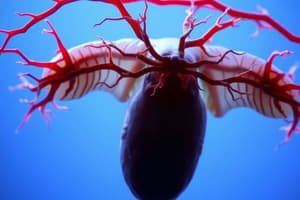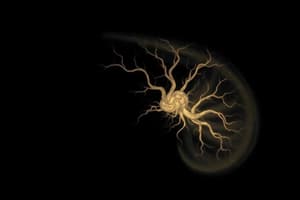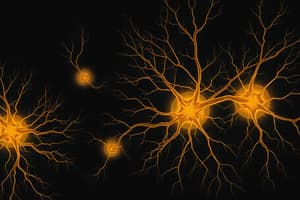Podcast
Questions and Answers
What is a characteristic of melanomas that indicates they are about to metastasize?
What is a characteristic of melanomas that indicates they are about to metastasize?
- Differentiation into mature melanocytes
- Horizontal movement towards the epithelium
- Vertical movement towards the stroma (correct)
- Increased proliferation rate
What is the term for the process by which cells lose their tissue-specific characteristics?
What is the term for the process by which cells lose their tissue-specific characteristics?
- Metaplasia
- Hyperplasia
- Trans-differentiation
- Dedifferentiation (correct)
What type of tumors arise from cells that form various components of the central and peripheral nervous system?
What type of tumors arise from cells that form various components of the central and peripheral nervous system?
- Neuroendocrine tumors
- Neuroepithelial tumors
- Neuromuscular tumors
- Neuroectodermal tumors (correct)
What term describes the transformation of one adult cell type to another?
What term describes the transformation of one adult cell type to another?
What is the term for cancer with minimal deviation from normal tissues, but cell layer replacement is observed?
What is the term for cancer with minimal deviation from normal tissues, but cell layer replacement is observed?
What is a characteristic of small-cell lung carcinomas?
What is a characteristic of small-cell lung carcinomas?
Which type of cancer has substantial potential to invade underlying tissues?
Which type of cancer has substantial potential to invade underlying tissues?
What type of tumor does not fit neatly into one of the four large groups?
What type of tumor does not fit neatly into one of the four large groups?
What is the term for cancer in which the growth is deviated just minimally from normal tissue, but may contain an excessive number of cells?
What is the term for cancer in which the growth is deviated just minimally from normal tissue, but may contain an excessive number of cells?
What is the term for an abnormal increase in the number of cells in a tissue or organ?
What is the term for an abnormal increase in the number of cells in a tissue or organ?
What is the characteristic of Dysplastic cancer cells?
What is the characteristic of Dysplastic cancer cells?
What is the term for a disorder of cell growth and differentiation, leading to abnormal tissue structure and function?
What is the term for a disorder of cell growth and differentiation, leading to abnormal tissue structure and function?
What is the term for the transition zone where one type of epithelium meets another type of epithelium?
What is the term for the transition zone where one type of epithelium meets another type of epithelium?
At which stage of cancer development does cell layer replacement occur?
At which stage of cancer development does cell layer replacement occur?
What is the term for cancer that has not invaded underlying tissues?
What is the term for cancer that has not invaded underlying tissues?
What is the term for the process of cancer development from normal to severe aggressive cancer?
What is the term for the process of cancer development from normal to severe aggressive cancer?
What is the primary characteristic of metastatic cancer?
What is the primary characteristic of metastatic cancer?
What is metaplasia?
What is metaplasia?
Which of the following is NOT a factor that affects cancer formation?
Which of the following is NOT a factor that affects cancer formation?
What was the significance of Katsusaburo Yamagiwa's discovery in 1915?
What was the significance of Katsusaburo Yamagiwa's discovery in 1915?
What is the primary mechanism by which carcinogens act on cells?
What is the primary mechanism by which carcinogens act on cells?
What is the term for the abnormal growth of cells that is not yet cancerous?
What is the term for the abnormal growth of cells that is not yet cancerous?
What is the term for an increase in the number of cells in a tissue?
What is the term for an increase in the number of cells in a tissue?
What is the term for the process by which normal cells become cancerous?
What is the term for the process by which normal cells become cancerous?
Flashcards are hidden until you start studying
Study Notes
Neuroectodermal Tumors
- Arise from cells that form various components of the central and peripheral nervous system
- Examples: Gliomas, Glioblastomas, Neuroblastomas, Schwannomas, and Medulloblastomas
Medulloblastoma
- A type of neuroectodermal tumor
Tumors That Don't Fit into Major Classifications
- Melanomas: derived from melanocytes, arise from embryonic neural crest cells
- Small-cell lung carcinomas (SCLCs): contain cells related to neurosecretory cells
- Anaplastic tumors: shed tissue-specific characteristics, making it difficult to identify the tissue of origin
Cancer Development
- Complex and multi-step process
- Gradual difference in tumor development from normal to aggressive cancer
- Each type of growth represents a distinct step in cancer development
Phases of Cancer Development
- 4 steps:
- Hyperplastic: excessive number of cells, minimal deviation from normal tissue
- Metaplasia: cell layer replacement, usually observed in epithelial transition zones
- Dysplastic: cytologically abnormal cells, no invasion to underlying tissue
- Neoplastic: malignant tumors with potential to invade underlying tissues
- Metastatic: cancer capable of seeding new tumor colonies
Factors Affecting Cancer Formation
- Heredity: cancer-susceptibility alleles at different frequencies (e.g. BRCA1, BRCA2 mutations)
- Environment: air, food, water, lifestyle, dietary choices, and tobacco usage contribute to disease incidence rate
Environmental Factors and Cancer Development
- Initial observations:
- 1761: first report connecting nasal cancer and tobacco snuff
- Later: lung cancer documented at high rate with people working in silver mines
- Exposure to X-ray associated with lung cancer
- 1950: evidence for direct link between heavy cigarette smoking and lung cancer
Carcinogens
- Chemicals that can induce tumor formation (e.g. coal tar)
- Divided into three categories:
- Chemical
- Physical
- Viral
Carcinogens Act as Mutagens
- 1927: Hermann Muller discovered that x-ray can induce DNA mutation in Drosophila
- Chemical carcinogens can also induce genomic mutations
- Speculation that cancer is a disease of mutant genes started to be initiated
Studying That Suits You
Use AI to generate personalized quizzes and flashcards to suit your learning preferences.




